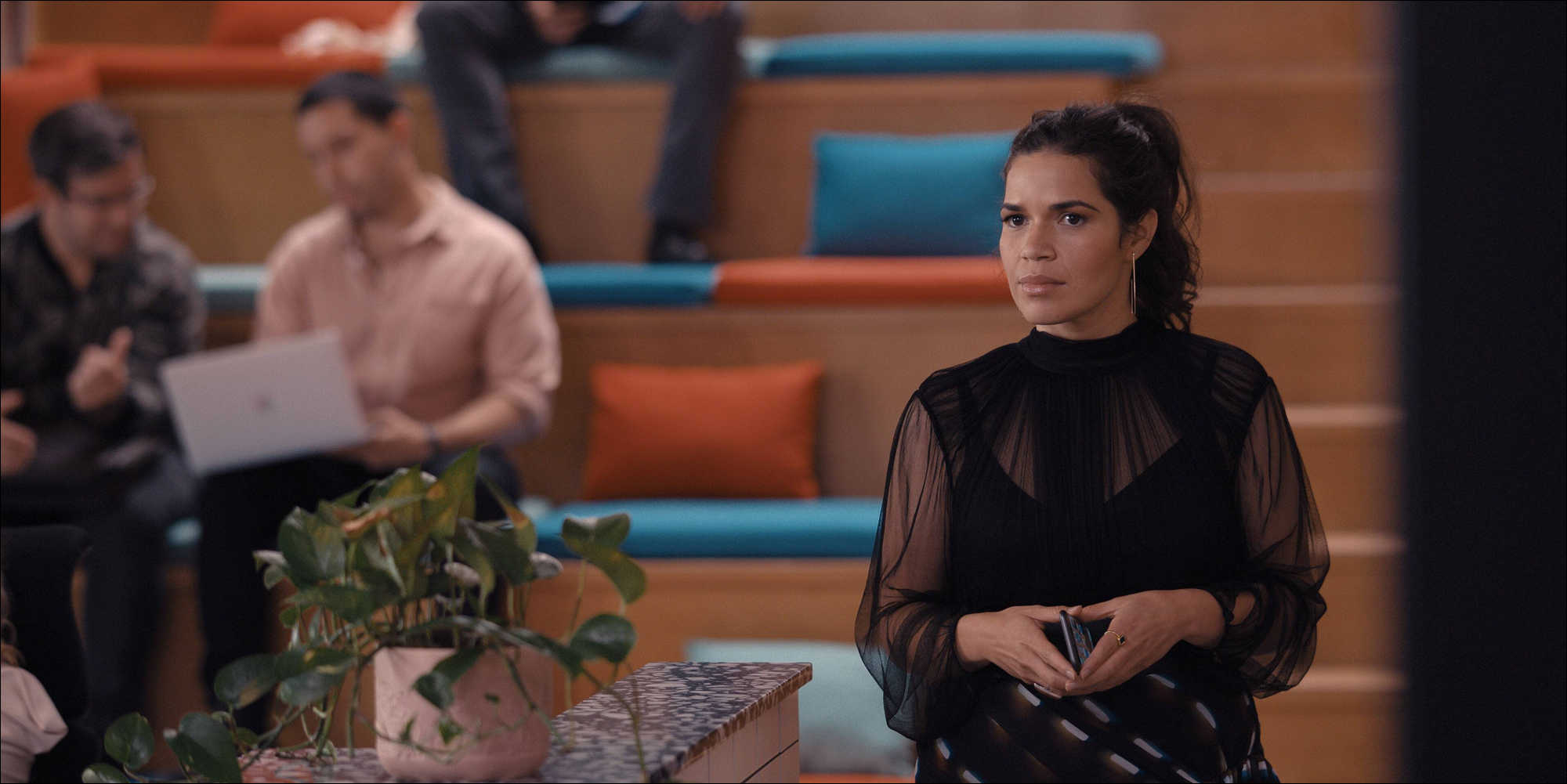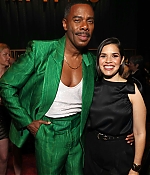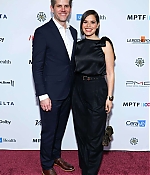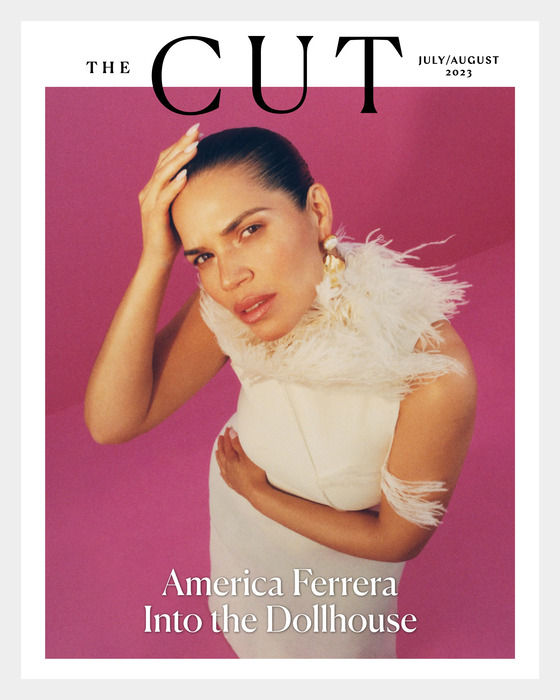

Is Rebekah Neumann a magician, maverick, or muse? Those are the three possibilities a brand consultant presents to Anne Hathaway’s character in WeCrashed’s fifth episode. “I wanna be in Vanity Fair,” Rebekah replies. The consultant says that only two of the three m’s make it into V.F.—and she’s chosen the wrong one.
Rebekah’s rebrand comes at the recommendation of Elishia Kennedy, a raw-juice empire CEO played by America Ferrera. In a stunning leap of faith, Elishia leaves her company to join WeWork—lured by the charms of Adam Neumann (Jared Leto) and Rebekah’s friendship. She’s even set to appear alongside Adam in the pages of Vanity Fair as the company’s chief brand officer. But like many who buy what WeWork is selling, Elishia becomes collateral damage in another person’s rise to the top.
While Ferrera had heard of WeWork, it was only after receiving the WeCrashed script that she listened to the Wondery podcast on which the show is based and watched Hulu’s documentary about the company, she tells Vanity Fair. During her research, Ferrera found herself fascinated by the “magic thinking” that infected those beckoned to unicorn companies like WeWork. It’s a narrative at the heart of this season’s glut of shows about maligned start-ups, including The Dropout (Theranos) and Super Pumped (Uber). “That kind of thinking says so much about who we are,” Ferrera says. “And I do think it’s a particularly American kind of thinking that everything and anything is possible.”
Unlike Adam and Rebekah, Elishia is a fictional character in the Apple TV+ series. But her trajectory parallels that of Julie Rice, SoulCycle’s cofounder. Rice joined WeWork as chief brand officer in 2017—before leaving when Rebekah reportedly decided to assume that title herself. Ferrera didn’t speak with Rice during the show’s prep, but did familiarize herself with the circumstances surrounding her employment. “I made myself aware of Julie and the role she played,” she says. “But for me, Elishia is much more about seeing someone who is honest and smart and well-meaning, against her own better judgment, get swept up in the pull and magnetism and the gravity of the story that was being told.”
Elishia’s WeWork entanglement begins when she meets Rebekah at a costumed benefit for their children’s school. Ferrera’s eyes peek out over a mummy costume, while Hathaway’s character sports an elaborate Avatar getup. “They find themselves in a situation that is laughable and really undercuts any kind of decorum or seriousness that they might have had if they met at a PTA meeting,” Ferrera explains. “It’s part of why there’s the opportunity for a genuine connection—because they’re both the ridiculous outcasts in that moment.”
With the ice broken, Rebekah and Elishia experience what Ferrera describes as “a plug in a socket” moment. “They both needed and could give what the other one needed and could give,” she says. “Rebekah found a disciple in Elishia, and Elishia found connection and inspiration and a reflection of herself that she wanted to see. She wanted to feel extraordinary and like a special person. Rebekah reflected that back to her. And so they really, in a way, were the perfect match for each other.”
The characters also bond over the ways in which women are conditioned to feel small in the workplace. Ferrera, who in real life helped launch Time’s Up (her actual photo with Gloria Steinem is used in the series), felt a familiar pang when filming this scene. “To a larger degree, that is the dynamic that is set up when so few women are allowed in the room, never mind women of color,” she says. “There’s a very small piece of the pie, and you’re in competition with everyone else for it.”
After all, lurking beneath the surface of Elishia and Rebekah’s friendship is the opportunity to commodify it for WeWork’s benefit. But Ferrera says that Rebekah’s ultimate betrayal of Elishia—seizing upon her job title and V.F. spread—is more personal than systemic. “I don’t think Rebekah’s competition with Elishia has as much to do with Elishia being another woman in her territory so much as Rebekah seeing in Elishia what she so desperately wants for herself, which is a purpose and a talent and being good at something,” Ferrera explains.
These feelings of inadequacy are only exacerbated by Adam’s natural charisma. “It’s definitely present with how [Rebekah] feels for Adam…being the superstar that he becomes,” Ferrera says. “She can’t really compete on that level because she’s not the founder of this company. But she sees an opportunity and a hope that she could step in and be what Elishia was being.”
Ferrera’s character doesn’t judge Rebekah’s power plays—offering her advice over happy hour cocktails and introducing her to the three m’s brand consultant. Then again, Elishia never “thought that it was going to turn against her.” But backfire it does. In her dramatic departure from WeWork, Elishia does some twisting of her own, hurling her once-consoling words back at Rebekah. “You’re small,” she tells her. “And you’re worried that [Adam] outshines you because he does. You have no light of your own.”
Despite the scene’s emotionally charged atmosphere, Ferrera says she and Hathaway found pleasure in taking a few swings. “We shot it a bunch of different ways and went very big, which is always very fun to do. It was like our Dynasty moment,” Ferrera says. “Then [we] did improv insulting, things that didn’t necessarily make the cut, but it was really fun to both be glammed up and trying to take each other down.”
In hindsight, Ferrera says it’s easy to point out the flaws in WeWork’s design. But many of us could’ve been seduced by the company’s promise, just as her character was. “So many of those people [at WeWork] were hardworking, well-meaning, quite intelligent human beings who fell victim to a larger cultural tendency to want to believe that the next world-changing start-up is inevitable,” Ferrera says. “And why shouldn’t it be you who becomes a millionaire or billionaire, getting in on the ground floor?”
Source: Vanity Fair






































